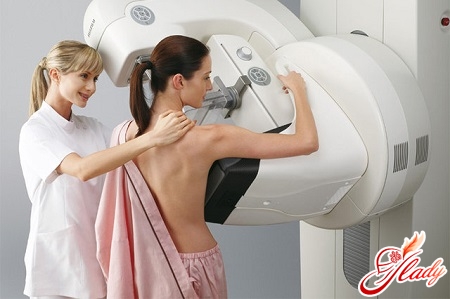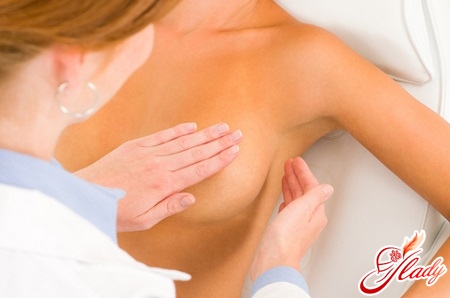
Mastopathy becomes ubiquitousa common female disease. Cystic fibrosis mastopathy is a wide range of benign pathological changes in the tissues of the female mammary glands. Small seals, swelling of the mammary glands, accompanied by a pain syndrome, occur periodically in almost every woman. These completely physiological phenomena are often associated with the activation of hormonal processes in the mammary glands, and there is no need to treat them. Despite the unpleasant manifestations, most forms of mastopathy (forming cystically or fibrotic) are not dangerous. But mastopathy, especially in the nodal form, can make it difficult to diagnose malignant tumors, and sometimes contribute to their development. Identify the signs of cystic fibrosis mastopathy from the beginning, but often these symptoms go unnoticed because of the similarity with periodic manifestations of mastalgia. It is not considered a deviation from the norm, but it can progress, becoming permanent, independent of the periodicity of the menstrual cycle, and in the mammary glands there may appear stable changes of the cystic or fibrous type. With mastopathy, swelling, a feeling of raspiraniya and pain in the mammary glands are strengthened and from the cyclic can become permanent. The nature and intensity of pains are different: blunt, aching, pricking, burning. They affect both or one mammary gland, localizing in one place or covering the whole organ. There may be soreness of the nipples, a change in their shape, and sometimes a discharge of fluid from them. In the tissues of the mammary glands, especially painful limited areas of the seals are palpated, which do not resolve after the end of the menstrual cycle. Possible changes in the relief of the skin and the shape of the mammary glands. In mastopathy of the nodal type of compaction, in comparison with the seals characteristic of the diffuse form, they are denser and with more definite boundaries. Cystic fibrosis mastopathy can be accompanied by an increase in axillary or supraclavicular lymph nodes. There are often cases when appearing in the mammary glands of the seal of a cystic fibrous nature do not cause anxiety.

Diagnostic Methods
Early diagnosis of mastopathy is notpresents difficulties. Neoplasms are detected already with external examination and palpation (probing). The most informative and accurate way of diagnosing pathological elements is a special method of radiographic analysis, that is, a mammogram. It fixes neoplasms, starting with a size of 2-3 mm. If there are secretions from the nipples, conduct a doktograficheskoe examination (a kind of mammography). In cases of detection of the nodular form of mastopathy or suspicion of malignant formation, a puncture is used for cytological examination. Some cases require hormonal studies (estrogen, progesterone, prolactin) and biopsy of breast tissue.
What can lead to the development of mastopathy
Mastopathy as a disease is known for more than a hundred years,but the idea of the mechanism of its occurrence is basically probabilistic. There is a whole range of causes and factors that cause the appearance of cystic or fibro-altered tissues in the mammary glands. The main cause of the disease is considered to be violations of the hormonal background of the body. The activity of endocrine glands is so subtle and complex that it can be broken by any processes that occur with a deviation from the norm. Especially strong influence is rendered by pathological disturbances in thyroid gland functioning, diseases of genital organs and liver. The activity of the mammary glands provides 15 different hormones. The mammary glands react sensitively to any deviation from the hormonal balance in the body. Fatty tissue of the breast is able to actively capture and accumulate hormonal substances. Increase the risk of fibroid-cystic disease of the thyroid disease, caused by imbalance in the hypothalamus and pituitary gland, and the associated metabolic disorders, diabetes and obesity. Diseases of the liver and bile ducts are dangerous, which is accompanied by violations of lipid, hormonal metabolism and leads to hormonal failures. Cystic fibrosis mastopathy occurs against a background of low immunity, chronic stress, increased mental and physical overload, hypothermia, unbalanced nutrition, smoking. Especially often mastopathy develops in the presence of chronic and acute gynecological diseases, accompanied by impaired hormone production. Often pathologies in the mammary glands are noted after the termination of pregnancy, with late delivery, uncontrolled use of contraceptives, certain medications, especially hormonal and antidepressants. Provoke the onset of the disease may be hereditary predisposition, neuroses and depression, multiple or single injuries, especially with deep injuries. 
Or maybe the parasites are to blame?
Often an opinion is expressed that mastopathyis due to parasitic lesions, for example, Trichinella. In support of this theory says that many cases of mastopathy are known in children. Mammary glands - derivatives of sweat glands, under the influence of certain factors the body begins to use the mammary glands to place there unnecessary, pathologically harmful organisms: microbes, fungi, worms. Circular-longitudinal muscle fibers of the nipple skin and around it appear tuberosity - evidence of the presence of Trichinella larvae. It is from there that liquids can escape, including purulent ones. The mammary gland is densely pierced by closed networks of lymphocapillaries, through which the larvae of Trichinella freely enter the body and can live in the blood and lymphatic systems, freely migrating to any organ. In a closed network of lymphocapillaries, they are confused in dense formations - conglomerates. The organism, trying to isolate them, envelops them with a fibrous tissue - so there is a fibroadenoma. Trichinella can clog the blood capillaries, then the liquid part of the blood seeps into the surrounding tissue, and the body builds protection from the fibrous membrane - a cyst appears. These processes can occur singly or simultaneously and cause the development of fibrocystic mastopathy.
Mastopathy: self-treatment is excluded
Treatment of mastopathy is carried out in a complex manner, withusing different methods, the combination of which is determined by many factors. In addition to the results of the examination, the age of the patient, the accompanying diseases, the features of physiological development, and much more are of great importance. The basis of successful treatment is the elimination of the causes that led to the disease. This is the normalization of the activity of the endocrine glands, the restoration of the hormonal background and metabolism, the cure of existing diseases, the cessation of the formation of new seals, the reduction of the pain syndrome. In the early stages of mastopathy of the cystic and fibrous-diffuse type, not burdened by gynecological and endocrine diseases, therapy is predominantly symptomatic. Homeopathic remedies that have practically no contraindications and restrictions on the period of use are successfully used for treatment. They slow the formation of new and proliferation of already existing foci of mastopathy and reduce soreness and swelling of the mammary glands. The most commonly prescribed are plant-based medicines, herbal teas and herbal teas that normalize metabolism, accelerate the removal of toxins and provide anti-inflammatory and analgesic effects. To alleviate pain, external agents in the form of applications or compresses help. Hormonal preparations are used in the therapy of cystic fibrosis mastopathy relatively recently, but they have already proved effective in inhibiting pathological changes in breast tissue. These drugs proved to be effective in the late stages of diffuse mastopathy. According to the results of a blood test, the funds are selected with different mechanisms and direction of action: suppressing estrogens, slowing down the synthesis of the hormone of the pituitary gland prolactin and others. It turned out that hormonal contraceptives have a curative and prophylactic effect. They contain gestagens and estrogens in ratios that can smooth the instability of the hormonal background of the menstrual cycle. Nodular mastopathy at the initial stages can be treated with conservative methods. In advanced cases, excision of altered tissues is required. However, in this case, it is necessary to continue treatment activities.









